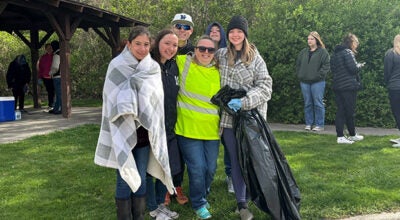Ask Trooper Rob: Deadly force may not be used for protection of property
Published 10:49 pm Wednesday, September 12, 2012
If someone is trespassing and or stealing my property, may a gun be used to protect my property and home? — Sara from Dowagiac
Sara, very good question, as this question has come up in the past. It is is a common myth that deadly force may be used to defend property. MCL 780.971-974, defines when deadly force may be used. Commonly known as the “Castle Doctrine,” the Self-Defense Act, MCL 780.972, use of deadly force by an individual not engaged in commission of crime; conditions states Sec. 2.
According to Section 1, an individual who has not or is not engaged in the commission of a crime at the time he or she uses deadly force may use deadly force against another individual anywhere he or she has the legal right to be with no duty to retreat if either of the following applies: (a) The individual honestly and reasonably believes that the use of deadly force is necessary to prevent the imminent death of or imminent great bodily harm to himself or herself or to another individual. (b) The individual honestly and reasonably believes that the use of deadly force is necessary to prevent the imminent sexual assault of himself or herself or of another individual.
According to Sec. 2, an individual who has not or is not engaged in the commission of a crime at the time he or she uses force other than deadly force may use force other than deadly force against another individual anywhere he or she has the legal right to be with no duty to retreat if he or she honestly and reasonably believes that the use of that force is necessary to defend himself or herself or another individual from the imminent unlawful use of force by another individual.
MCL 780.973, Duty to retreat; effect of act on common law.
Sec. 3 states except as provided in section 2, this act does not modify the common law of this state in existence on October 1, 2006 regarding the duty to retreat before using deadly force or force other than deadly force. MCL 780.974, Right to use deadly force; effect of act on common law.
Sec. 4 states this act does not diminish an individual’s right to use deadly force or force other than deadly force in self-defense or defense of another individual as provided by the common law of this state in existence on Oct. 1, 2006.
In the line of duty
On Aug. 30, 1985, about 10:30 p.m., Tpr. Paul Hutchins and a female companion were walking along the riverfront near Hart Plaza. Hutchins was off-duty from his duties at the Detroit Freeway Post when they were accosted by two youths carrying fishing rods, one of whom pulled out a handgun. The robbers demanded the couple’s wallets. Hutchins surrendered his wallet, but the gunman noticed the bulge of another wallet in his pocket and demanded that one also.
Realizing the robbers would discover this wallet contained his police identification and badge, and also believing they noticed the bulge of his snub-nosed revolver under his shirt, he took action.
He pushed his girlfriend out of the line of fire and ran a short distance, pulling the revolver as he ran. Just as he turned and announced his authority, the gunman shot Hutchins once in the top of the forehead. Both suspects then fled the scene. Hearing the screams of the female, security personnel notified emergency medical assistance. Transported to Detroit Receiving Hospital, Hutchins died about 4:30 a.m. Aug. 30, 1985.
A task force launched a thorough investigation and in the fall of 1986, four members of the Be-Like Gang were indicted by a grand jury.
Three of them were 17 and the fourth was 21 at the time of the shooting. All four were convicted of second-degree murder and armed robbery and were sentenced to 150 to 300 years in prison, with no possibility of parole.
A Lansing native, Hutchins studied Law Enforcement at Lansing Community College and Michigan State University before joining the MSP on June 11, 1978. He was posthumously awarded the Medal of Valor, is buried in Lansing and became the 39th trooper to die in the line of duty.
At graduation of the MSP Academy, Hutchins’ badge was pinned to his uniform by his father, Robert, who had retired from the MSP in 1973.






